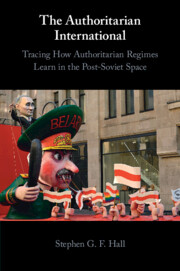‘Dr Hall pushes forward the literature on authoritarian learning. The lessons learned from this book's conceptual framework and case studies will serve as the foundation for future scholars researching the current wave of autocratic resilience.’
Thomas Ambrosio - Professor of Political Science, North Dakota State University
‘The Authoritarian International is a fascinating exploration of the complex ways in which authoritarian states in the post-Soviet space learn, adapt and evolve as regimes by fashioning a common repertoire of repressive and manipulative strategies. Stephen Hall has drawn on extensive primary research to construct a new understanding of a topic that is of growing importance in the contemporary world.’
Sarah Birch - Professor of Political Science, King’s College London
‘Dr Hall’s book is a landmark in the study of authoritarian learning. It analyses how and why regimes learn, or fail to learn, from the successes and failures of measures taken by themselves and their neighbours to strengthen their hold on power.’
Peter J. S. Duncan - School of Slavonic and East European Studies, University College London
‘In a world where authoritarian regimes increasingly challenge democratic societies and norms, this is an essential handbook for western scholars and policymakers alike.’
Roberto Foa - Director of the Centre for the Future of Democracy, University of Cambridge
‘This book provides a perceptive account of the ways in which stable authoritarian rule rests on processes of authoritarian learning. Through a careful comparison of post-Soviet cases, Hall illuminates how authoritarian leaders and their officials collude and learn from one another to avoid failed survival strategies and emulate successful ones. The book makes a strong case that elite learning must be placed at the centre of theories of authoritarian stability.’
Oisin Tansey - Kings College London
‘It is often said that democratisation comes in 'waves'. Authoritarian states can copy each other too. They also learn from their own past successes and failures, and from malpractice in democratic states. Hall provides a fascinating study of authoritarian adaption and durability.’
Andrew Wilson - Professor of Ukrainian Studies, UCL SSEES
‘… an extremely well-researched study that offers many insights into the intricate government structures and personal networks of four post-Soviet polities: Russia, Belarus, Ukraine and the Republic of Moldova.’
Nadja Douglas
Source: H-Soz-Kult
‘This book is a welcome addition to the literature and data on authoritarian learning. In particular, it advances our analysis beyond assumptions about learning towards a rigorous analysis of how learning comes about …’
Paul Fisher
Source: Europe-Asia Studies



